World Geography And Politics Daily News | 16 May 2023

Views (171)
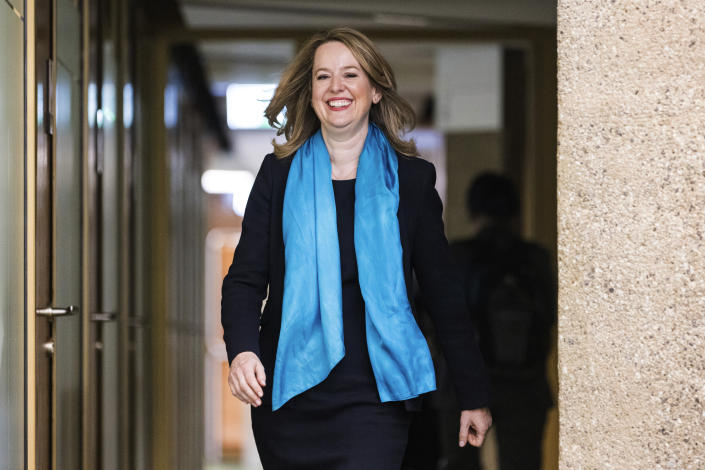
Pacific Island leaders urge world to put aside differences in combating impact of climate change
Pacific Island leaders criticized rich countries on Monday for not doing enough to control climate change despite being responsible for much of the problem, and for making money off of loans provided to vulnerable nations to mitigate the effects. Leaders and representatives from Pacific Island nations demanded at a U.N. climate change conference in Bangkok that the world make more effort to put aside differences in combating the environmental impact, especially as their countries emerge from the economic devastation of the COVID-19 pandemic. Prime Minister Mark Brown of the Cook Islands said the finance model for combatting climate change — giving out loans to reduce the impact — is “not the way to go” for countries in his region with such small populations that produce “inconsequential amounts of carbon emissions” but suffer the most from the effects.
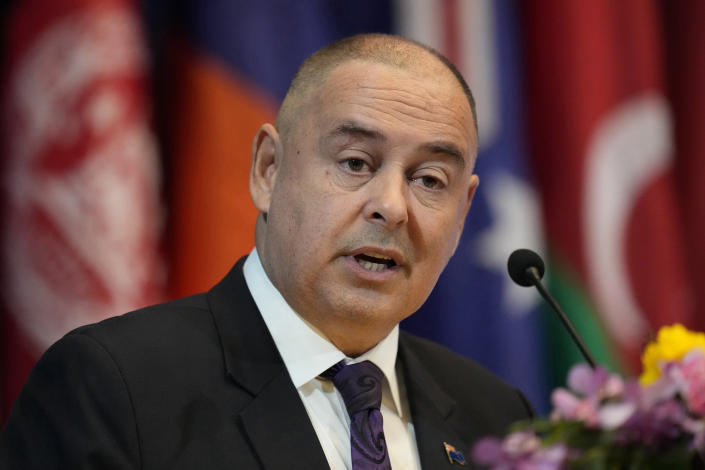
BANGKOK (AP) — Pacific Island leaders criticized rich countries on Monday for not doing enough to control climate change despite being responsible for much of the problem, and for making money off of loans provided to vulnerable nations to mitigate the effects.
Leaders and representatives from Pacific Island nations demanded at a U.N. climate change conference in Bangkok that the world make more effort to put aside differences in combating the environmental impact, especially as their countries emerge from the economic devastation of the COVID-19 pandemic.
Prime Minister Mark Brown of the Cook Islands said the finance model for combatting climate change — giving out loans to reduce the impact — is “not the way to go” for countries in his region with such small populations that produce “inconsequential amounts of carbon emissions” but suffer the most from the effects.
He encouraged a shift toward grants or interest-free loans to help ease the financial burden on poorer countries.
“All we’re doing is adding debt to countries that have come out of COVID with increased debt, and to me it is actually quite offensive that we would be required to borrow money to build resilience, and to borrow from the very countries that are causing climate change,” he told The Associated Press.
Brown said his country lost an estimated 41% of its GDP because of the pandemic, “a loss of a decade’s worth of prosperity.”
He said he will give this message to leaders when he represents his tiny South Pacific nation with a population of about 17,000 at a summit later this week of the Group of Seven leading industrialized nations in Japan, where he hopes to be able to speak on a more equal footing to the leaders than as “a grateful recipient” to “benevolent donors.”
Palau President Surangel S. Whipps Jr. agreed that financing opportunities are “few and difficult,” and criticized wealthy countries for failing to commit to provide the financial help they had promised, which he said represents only a tiny portion of their prioritized expenditures such as the military.
“We didn’t cause the problem, but now they’re going to make money off of us by giving us a loan so we can pay back with interest,” he told The Associated Press. “So now you have to adapt, but we’ll give you money and make money off of you by giving you that money to adapt. That doesn’t make sense.”
Whipps said Palau’s economy relies heavily on tourism, which is greatly threatened by the impact of climate change. The country’s economic security is also a major issue in Palau's negotiations with the U.S. on the “Compacts of Free Association,” a broader agreement that will govern its relations with Washington for the next two decades. Those ties grant the U.S. unique military and other security rights in the islands in return for substantial aid.
Whipps said the administration of President Joe Biden has promised approximately $900 million over the 20-year period. While the amount is “definitely less” than what his country would have wanted, Whipps said he is largely satisfied with the terms, renegotiated from what was achieved during the administration of former President Donald Trump.
While there are some concerns that the U.S. Congress will cut foreign aid and in turn affect this funding, Whipps said he expects Washington will honor the agreement, which he hopes can be signed by both sides in Papua New Guinea next week.
Brown said efforts to tackle climate change and build resilience to its impact, such as better infrastructure and greater water and food security, require lots of money, especially for island nations with small populations. He said $1.2 billion a year for the region to spend on climate adaptation and mitigation measures would be “a starter.”
“The fact remains that the underlying solution to assist countries that are facing the impacts of climate change is to build resilience, and building resilience takes money,” he said.
With Turkey's presidential election going to a runoff, what comes next?
Close, but not close enough. Turkish President Recep Tayyip Erdogan received the most votes in a weekend presidential election but could not claim victory because he failed to get the majority support required for an outright win. Preliminary results showed the longtime leader had 49.5% of the vote.
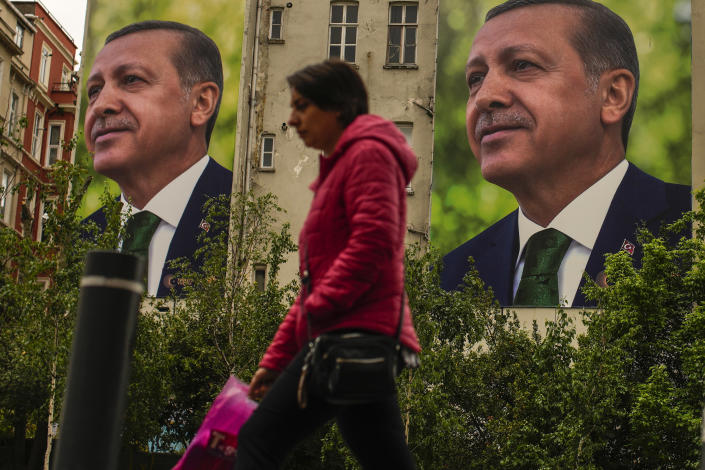
The election is being followed internationally to see the future direction of Turkey. The strategically located NATO member has cultivated warm relations with Russia, become less secular and tilted toward authoritarianism under Erdogan.
Kilicdaroglu has promised to reorient the country as a democracy and is expected to adopt a more pro-Western stance.
The Supreme Electoral board said Monday the results mean Erdogan, 69, and Kilicdaroglu, 74, will compete in a runoff election on May 28. Here’s a look at Turkey’s two-round presidential election system and what happens next:
HOW DOES THE TWO-ROUND ELECTION WORK?
The change, which took effect after the 2018 elections, abolished the office of the prime minister and concentrated broad powers in the president's hands.
It was therefore decided that the head of both state and government needed to receive more than 50% of the vote to secure office in a single election. Since neither Erdogan nor Kilicdaroglu did that Sunday, the two front-runners must face each other again in two weeks, while the third candidate is out of the running.
France and some other European countries use a similar process for electing presidents.
WHAT PART DOES THE THIRD CANDIDATE PLAY?
Ogan, 55, a former academic who was backed by an anti-migrant party, could become the kingmaker in the runoff now that he's out of the race. He hasn't yet endorsed either of the remaining candidates.
Turkish nationalists disgruntled with Erdogan but reluctant to vote for Kilicdaroglu, who had support from a six-party alliance and the pro-Kurdish People’s Democratic Party, or HDP, appear to have accounted for most of Ogan's votes.
The far right accuses the pro-Kurdish party of having links to outlawed Kurdish militants - an accusation the party denies. Ogan has said he would not back any candidate “who doesn’t keep a distance with the terror organization.”
Soner Cagaptay, an expert on Turkey at the Washington Institute think tank, said most Ogan voters are likely to go for Erdogan whether or not their original candidate endorses the Turkish leader.
"It's certain that Erdogan is going to sweep the second round,” Cagaptay said.
WHAT ARE THE LIKELY SCENARIOS?
“We have no doubt that the preference of our nation, which gave the majority in parliament to the People’s Alliance, will be in favor of trust and stability in the (second round),” the president told his supporters in Ankara.
Kilicdaroglu, the leader of the Republican People’s Party, or CHP, said he was certain of a second-round victory, but Sunday's results indicate he could struggle to attract enough votes even though he was the candidate of the six-party Nation Alliance.
WHAT TO EXPECT BEFORE THE RUNOFF
Analysts suggest the campaigning before the runoff could be brutal. Before Sunday's vote, Erdogan disparaged the opposition as being supported by the outlawed Kurdistan Workers’ Party, or PKK. At one rally, he showed hundreds of thousands of his supporters a faked video purporting to show a PKK commander singing an opposition campaign song.
“Information control was President Erdogan’s greatest asset in running and entering the election season. And I think his media loyal to him has successfully framed HDP support to Kilicdaroglu as ‘terrorist support,’” Cagaptay said. “That helped scare away some nationalist voters.”
Kilicdaroglu said Erdogan had failed to get the result he wanted despite slinging “slanders and insults” toward the opposition.
The Turkish stock exchange, Borsa Istanbul BIST 100 index, dropped 6.2% at Monday’s opening before recovering some ground.
“Turkey’s political destiny remains on hold until the second round, scheduled for 28 May,” Bartosz Sawicki, market analyst at financial services firm Conotoxia, wrote in emailed comments. “(The outcome will) determine whether Turkey will continue down the path of unorthodox, imbalance-increasing policies or whether, after 20 years, it will return to a path of reform and recovery using methods more in line with economic textbooks.”
Putin simplifies citizenship process for foreigners fighting for Russia in Ukraine
Russian dictator Vladimir Putin signed a decree simplifying the citizenship process on May 15 for foreigners and stateless people fighting in the Russian military against Ukraine, according to the Russian government site.

Russian dictator Vladimir Putin signed a decree simplifying the citizenship process on May 15 for foreigners and stateless people fighting in the Russian military against Ukraine, according to the Russian government site.
A simplified pathway to Russian citizenship will now be available for those who sign a one-year Russian military service contract. Their spouses, children, and parents will also be eligible, according to the decree.
The decree, signed by Putin on May 15, has entered into immediate effect.
Abbas urges UN to 'suspend' Israel on Nakba anniversary
Palestinian president Mahmud Abbas called for Israel to end its "aggression" against Palestinians or be suspended from the United Nations during a speech marking the 75th anniversary of the "Nakba" Monday.More than 760,000 Palestinians fled or were expelled from their homes in 1948 when Israel was created, an event Palestinians call Nakba, or catastrophe, and mark on May 15.
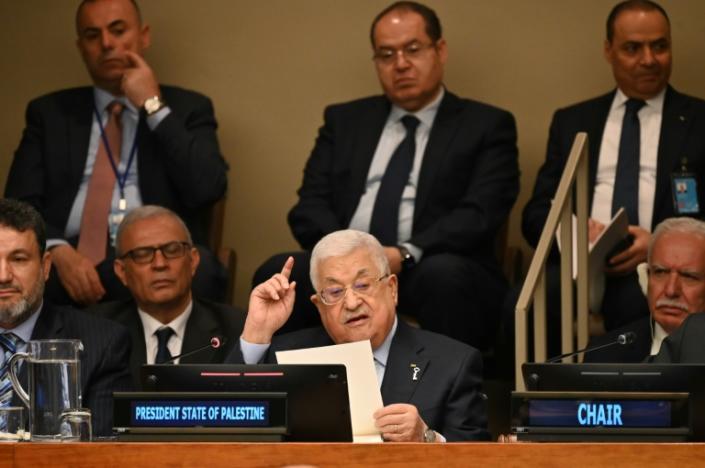
Palestinian president Mahmud Abbas called for Israel to end its "aggression" against Palestinians or be suspended from the United Nations during a speech marking the 75th anniversary of the "Nakba" Monday.
More than 760,000 Palestinians fled or were expelled from their homes in 1948 when Israel was created, an event Palestinians call Nakba, or catastrophe, and mark on May 15.
The United Nations is commemorating Nakba at its headquarters in New York this year for the first time, after a resolution was passed in November.
"We demand today officially, in accordance with international law and international resolutions, to make sure that Israel respects these resolutions or suspend Israel's membership of the UN," Abbas said during an hour-long speech.
Abbas, whose "State of Palestine" has observer status at the UN, spoke in Arabic at a special session of the Committee on the Exercise of the Inalienable Rights of the Palestinian People, to which dozens of UN ambassadors had been invited.
Israel's UN representative, Gilad Erdan, branded the event "despicable" and wrote a letter to other ambassadors urging them not to attend.
According to the Israeli foreign ministry, 32 countries, including the United States, Canada, Ukraine and 10 from the European Union, did not participate.
The UN's under-secretary general for political affairs and peace building, Rosemary DiCarlo, reaffirmed the UN's "clear position" that Israel's occupation of Palestinian territories must end because it is "illegal under international law."
Israel was established on May 14, 1948, following a UN vote in November 1947 that divided the British Mandate for Palestine into two Jewish and Arab states.
Abbas accused Israel of having "never fulfilled its obligations and the prerequisites for its membership" of the United Nations.
The Palestinian president counted "around 1,000 resolutions" adopted by the UN General Assembly, Security Council and Human Rights Council related to Israel.
"To date, not one single resolution was implemented," he said.
Abbas added that Nakba "did not start in 1948 and it did not stop after that date."
"Israel, the occupying power, continues its occupation and its aggression against the Palestinian people and continues to deny this Nakba and rejects international resolutions regarding the return of Palestinian refugees to their homeland," he said.
There are 5.9 million Palestinian refugees living in the occupied West Bank, the Gaza Strip, Jordan, Lebanon and Syria, according to the UN.
The memory of the Nakba has become a rallying point for the Palestinian quest for statehood.
It falls a day after Israel declared statehood in 1948, prompting an invasion by five Arab armies which the young nation defeated.
nr/pdh/nro/dw
Czechs raise $2.3 million to buy RM-70 rocket launcher for Ukraine
The people of the Czech Republic have raised $2.3 million for the Ukrainian Armed Forces as part of the Gift for Putin initiative to purchase RM-70 MLRS and 365 rockets for it, according to a Twitter post dated May 14.

"In just two and a half months, 19,165 individuals and companies contributed," the organizers said.
“The rocket launcher is expected to be deployed in a matter of weeks.”
On May 15, the initiative is starting a new collection for “something truly explosive.”
UN migration agency elects American as 1st woman director, replacing her European boss
Amy Pope of the United States elbowed aside her European boss Monday to land the top job at the International Organization for Migration, winning her bid to become the first woman to lead the U.N. migration agency. Pope, 49, defeated IOM Director General Antonio Vitorino of Portugal, the European Union candidate, who swept into the post five years ago by trouncing a candidate put up by the Trump administration for a job that has long been held by Americans. Vitorino’s prospects for a second term were clouded after Pope, with strong backing from the Biden administration, won the first round on a 98-67 vote.
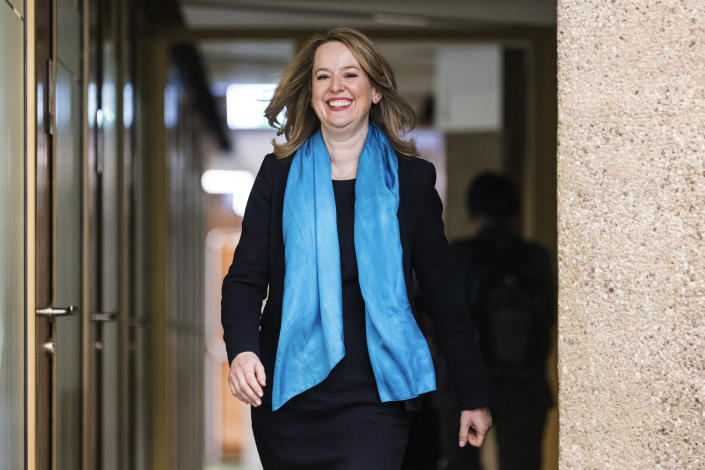
GENEVA (AP) — Amy Pope of the United States elbowed aside her European boss Monday to land the top job at the International Organization for Migration, winning her bid to become the first woman to lead the U.N. migration agency.
Pope, 49, defeated IOM Director General Antonio Vitorino of Portugal, the European Union candidate, who swept into the post five years ago by trouncing a candidate put up by the Trump administration for a job that has long been held by Americans.
Vitorino’s prospects for a second term were clouded after Pope, with strong backing from the Biden administration, won the first round on a 98-67 vote. After a lunch break, word emerged that Vitorino had pulled out of the race.
His withdrawal paved the way for Pope to win by acclamation after member states decided to forgo what was suddenly a formality: the IOM rules requiring a two-thirds majority to win an election.
“It’s an incredible moment in time to lead the International Organization for Migration, and I could not be happier to stand before you today to start that work," she told reporters after the closed-door voting by secret ballot and a speech to delegates afterward.
Pope and Vitorino shook hands and smiled as they arrived together for the announcement that she had won. She is expected to start her five-year term on Oct. 1, the IOM said in a statement.
The move also caps a renewed push by the Biden administration to maintain or recoup top posts in U.N. institutions, including the World Food Program, children's agency UNICEF, and the International Telecommunications Union, in recent months — after the Trump administration largely shunned several Geneva institutions.
“Ms. Pope’s election reflects a broad endorsement by member states of her vision to keep people at the heart of IOM’s mission, while implementing key governance and budget reforms to ensure IOM is prepared to meet the challenges it faces,” U.S. Secretary of State Antony Blinken said in a statement.
Eight of the agency's 10 directors general since the International Organization for Migration was founded 72 years ago have been American. The organization has nearly 19,000 staff members working in 171 countries to promote “humane and orderly” migration.
“The situation at the southern border of the United States underscores why it’s so critical that we approach migration from a much more comprehensive point of view," Pope said. “Many of those migrants have gone through extraordinary circumstances to end up at the border.”
Its job in many of its 560 field offices is to provide migrants with food, water, shelter and help with government-imposed paperwork. The agency also collects and shares vast amounts of data about flows of people to governments, and advises them on policy decisions.
Vitorino won praise for boosting the budget and staff at IOM, helping to hire and promote more women into top positions, and reaching out to developing countries, supporters said.
Vitorino, 66, is a former European Union commissioner for Home and Justice Affairs and think-tank chief who cut his teeth in politics as a Portuguese Socialist, much like U.N. Secretary-General Antonio Guterres.
Pope, a former prosecutor, served as migration adviser to President Joe Biden early in his administration and recently was Vitorino's deputy for reform and management.
The U.S. and the EU are both major funders of IOM facing challenges with mass migration. Critics fault the EU for failing to do more to prevent migrants from taking often-deadly boat trips across the Mediterranean Sea from North Africa to Europe.
Pope is likely to face extra scrutiny in whether she speaks out against any perceived missteps in Biden’s migration policy, and she alluded to the difficulties faced by migrants who trek across central America to reach the United States.
“As the director-general for the International Organization for Migration, I’m not working for the United States government,” she said. “So my view is that it is important that we as an organization call out practices, no matter who they’re coming from, and acknowledge whether they work or they don’t work.”
IOM, which counts 175 member countries, is responding to mass migration crises in places as diverse as Bangladesh, Ukraine, Sudan and South American nations that neighbor Venezuela.
0 Likes
